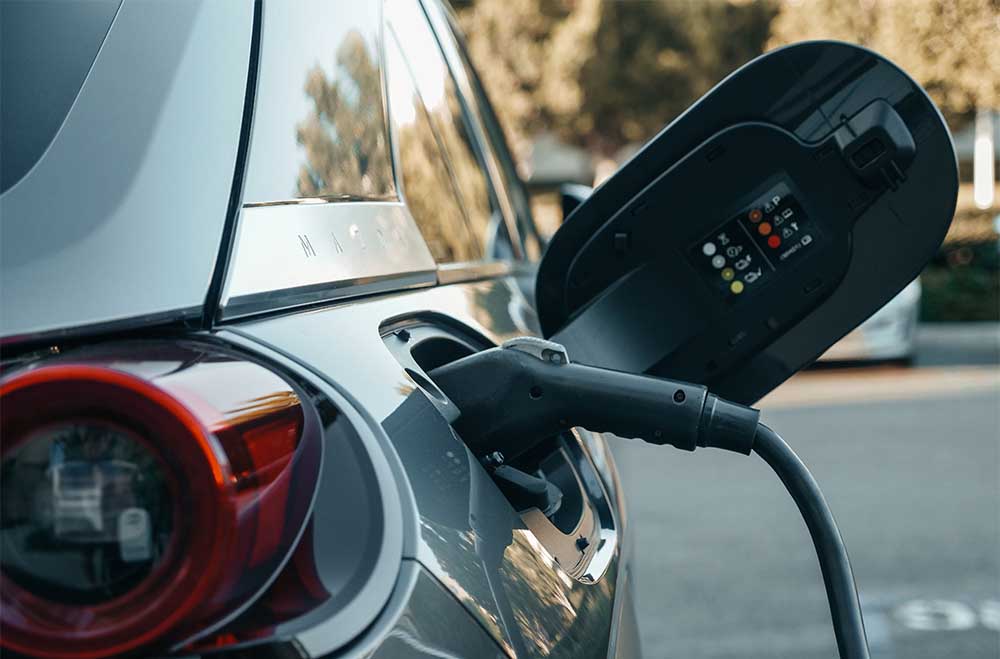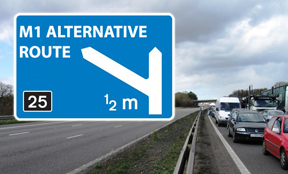
With sales of new petrol and diesel cars set to end in 2035, the number of people buying electric cars is expected to surge – but how can drivers who live in an apartment or flat charge their new electric car?
Here motoring journalist and expert Pete Barden takes a look at the practicalities for millions of drivers who don’t have the luxury of a private driveway to install a charger.
While many early-adopters of electric cars (EVs) are typically from affluent areas with plenty of off-street facilities to charge their vehicles, banning the sale of new petrol and diesel-powered cars will see many more people living in apartments or homes without access to off-street parking hunting for ways to charge the EV they’re being pushed to purchase.
Here we answer their questions about charging options currently on offer – or planned for the future - for people living in apartments or homes without off-street parking.
 Not everyone has a garage or private drive to charge
a car - such as those who live in flats or apartments (Credit: Pixabay)
Not everyone has a garage or private drive to charge
a car - such as those who live in flats or apartments (Credit: Pixabay)
-
TABLE OF CONTENTS
-
Charge an electric car from a flat or apartment
-
Put an EV charging cable across the pavement
-
Can I charge the car from a domestic plug?
-
How much to charge an EV using a public network?
-
Are there mobile electric chargers?
-
Share a charger with another EV owner
-
Are there enough public chargers?
-
Good news for apartment owners of the future
-
What if I run out of power while driving?
How do I charge an electric car if I live in a flat or apartment block?
Living in an apartment, other than on the ground floor, will likely make it impossible to have a private charger at many complexes – such as those in larger blocks without allocated parking spaces – so the best option could be to use the public charging network. However, with 40% of UK households not having access to off-street parking, the competition for these will be high – and set to increase.
Research from Zap Map, which lists the UK’s charging points, claims there were 49357 connection points in February 2022. However, not all of these will be accessible to all members of the public. Additionally, a large proportion of these, 32%, are located in London and a further 12.8% in the South East – leaving the rest of the UK hugely underserved.
You will need to do some research in your local area, with the help of apps such as Zap Map, to search for nearby chargers – but with plug-in car sales jumping from 233,000 in 2020 to 357,000 in 2021, the competition for public chargers is sure to be fierce.
The number of chargers will increase rapidly over the coming years, with the likes of a new network of lamp post chargers being brought online to quickly expand the options available to EV owners.
Can I put EV charging cable across the pavement to my car?
If you are lucky enough to live in a location where you can usually park outside your home, you could decide to simply trail the charging cable from a socket in your house or ground-floor apartment to your car across the pavement. But is this allowed?
There are no legal restrictions preventing you from running EV charging cables across the pavement, but the Local Government Association (LGA) has said that these should only ever be in place when the vehicle is charging.
Additionally, while there are currently no legal restrictions preventing EV owners from running cables across the pavement, should a pedestrian trip and cause injury then the EV owner who put the cable in place could be hit with a costly personal injury claim.
If you really have to charge the vehicle by running cables across the pavement, you could use a cable protector to hold the cable flat to the ground – such as the type used for road works etc – to reduce the trip risk. Make sure these are professionally produced items that are high-visibility colours and manufactured from non-slip materials. You will also need to remove it when finished charging.
You should also use a ground-floor power source, as cables dangling across public walkways will pose a serious health risk and would likely attract the attention of local authorities.
Can I charge an electric car using a domestic plug?
Most electric cars will not be able to be charged safely from a domestic three-pin socket using standard extension cables. Attempting to do this could put the user at risk, along with pedestrians and other vulnerable users if the cables straddle public land such as pavements. Overloading a domestic socket could also increase the risk of causing a fire.
Subscribe for free motoring and travel news here - support independent journalism
How much does it cost to charge an EV using a public network?
Buying an electric car will be seen as a way to help cut emissions – but also as a way to enjoy reduced motoring costs. However, while this may be true for many electric car owners who have the luxury of a private charging point on their own property, but this is not the case for those who need to use the public charging network.
With the prospect of new car sales for petrol and diesel-powered vehicles slated for 2035, the charging network could become a big money-spinner and many big companies are getting involved in building up the public network – and these companies will of course be answerable to shareholders, meaning higher prices at the ‘plug’.
Research by What Car? looked at how much companies charge for EV drivers using their services on public networks. Using a BMW iX3 with an 80kW battery in their research, the publication found that charging the battery could see costs vary between £9.25 at the cheapest end of the market, rising to more than £40 in other areas.
The increase in the cost of electricity will also hit all users – but those relying on a public network are liable to be hit harder than those who have their own home-based charger.
The end result could see those with a private space to install their own charger paying less than EV owners relying on the public network
A Which? Investigation found that using rapid or ultra-rapid public chargers, could be more expensive than buying fuel for a traditional combustion engine.
Are there mobile electric chargers?
Yes. There are mobile chargers, but many are not suitable or affordable for the average individual – with the likes of breakdown firms adding them to their vehicles to give a roadside charge to members who have run out of charge while out and about.
However, more options are coming to market. These include the likes of ZipCharge, which is planning to sell a suitcase-sized mobile charger that can be charged from a three-pin plug at home, then deliver a 20-mile charge in less than an hour. This would potentially cover most commutes or running around town. There is no price for this charger yet, but it has been reported that a subscription deal of around £49 a month could be an option.
Another way to get around not having a charger because you live in a flat or apartment, is with the help of a mobile charging firm. The likes of Charge Fairy (for specific car brands) can come to your car when it needs a charge and top it up ready for you to jump in and drive away. This can all be organised remotely through an app. This can be from £5.99 a week, according to Charge Fairy.
Share a charger with another electric car owner
Another solution for EV owners (or potential owners) who don’t have a drive or garage, is sharing a charger with someone who does. Chargers are rarely in use 24 hours a day, so sharing these could be a great option for both parties. Apps such as Co-Charger and Just Park allow people to search for chargers to share in their area or near a workplace etc. It’s a good way for those with off-street chargers to make some extra cash, too.
Are there enough public chargers if I buy an electric car but don't have private charging?
This is the big debate that is currently raging, with many industry bodies warning that the speed at which public chargers are being commissioned does not match the growth in electric car ownership across the UK.
The Society of Motor Manufacturers and Traders (SMMT) has urged the government to create a new regulator called "Ofcharge" - the Office of Charging - to keep a regulatory eye on how the overall electric car market develops as more people are pushed towards running an EV.
The SMMT has said that public charge points "remain critical to consumer confidence and are still relied upon by many commercial fleets, as well as the third of British households that do not have designated off-street parking."
A spokesman for the Department for Transport said the Government is spending £1.3bn "to support the continued roll-out of charge points at homes, businesses and on residential streets across the UK, levelling up our charge point provision while supporting the deployment of rapid charge points on motorways and major A roads in England".
The spokesman added that the government will publish its electric vehicle infrastructure plan in the near future, adding: "We continue to work with local authorities to ensure they are engaged in the transition, and are encouraging them to make use of the on-street residential charge point scheme which last year committed £20m for the rollout of public charge points in residential areas."
Good news for apartment owners of the future
New legislation announced by Boris Johnson will see building regulations altered to mean every new home built – including apartments and existing buildings changed into apartments – will need at least one EV charger for every dwelling with an ‘associated parking space’.
There is no compulsion to retro-fit existing apartment complexes with chargers, but it is likely that this could happen as the ban on new sales of petrol and diesel vehicles nears.
What if I run out of electric charge while out driving?
Breakdown firms such as the AA now equip many patrol vans with mobile chargers that can attend EVs that have run out of power and top them up at the roadside – giving them enough power to get to a place of safety or fixed charger.
More on electric vehicles and clean air
-
EVs and the London congestion charge
-
Electric van licence rules
-
One-pedal driving explained
-
EV charging at airports
-
Are electric car drivers more likely to crash - research revealed
-
EV range in hot weather
-
How to charge electric cars in the UK
-
Should you buy an electric car?
-
How to hire an electric car
-
Electric car licence and test rules
-
Most popular electric cars in the UK
-
EV charging in France for UK drivers
Most read motoring content
Take a look at more of our top motoring-related content here...
-
How much is road tax going up on 1 April 2022?
-
What happens to a car when the owner dies?
-
Will I get a speeding ticket after being flashed
-
Do I need to wear a mask in my car under Plan B restrictions?
-
Are driving tests being cancelled due to Covid?
-
Do I need to tell the DVLA about having Covid-19?
-
Can I be fined if the car park ticket machine is not working?
-
Is the M6 Toll Road free on Christmas Day?
-
How much is the Tamar Bridge toll and when do I need to pay it?
-
Do I need an electric car licence and driving test in the UK?
-
How can I find out who owns a car
-
Will I get a 6-month MOT extension because of the new Omicron variant this Christmas?
-
Do I need an international driving permit for France and Spain
-
How to spot a fake undercover police car
-
Is my green paper driving licence still valid and how much to swap for a photocard?
-
Can I drive in sliders in the UK - with or without socks
-
Electric car charging points at UK airports for public use - 2021
-
Are electric scooters a good Christmas present - find out the driving rules here
-
Are my sunglasses legal for driving?
-
Secret parking offences you're committing revealed
-
How old are my tyres - find out instantly here
-
What are the black dots on my windscreen for?
-
How far and how fast can I drive on a space saver spare wheel
Author: Pete Barden:
Twitter: @pete_barden
Pete Barden is a qualified journalist who has written and produced for publications including The Sun (thesun.co.uk), New Statesman Media Group, Whatcar? (Whatcar.com) Stuff Magazine (Stuff.tv), Fastcar Magazine (Fastcar.co.uk), Maxim Magazine and UK broadcast stations within the Heart network (Formerly GCAP). Pete specialises in motoring and travel content, along with news and production roles. You can find out more about Pete Barden on LinkedIn.
Read all articles by Pete Barden











